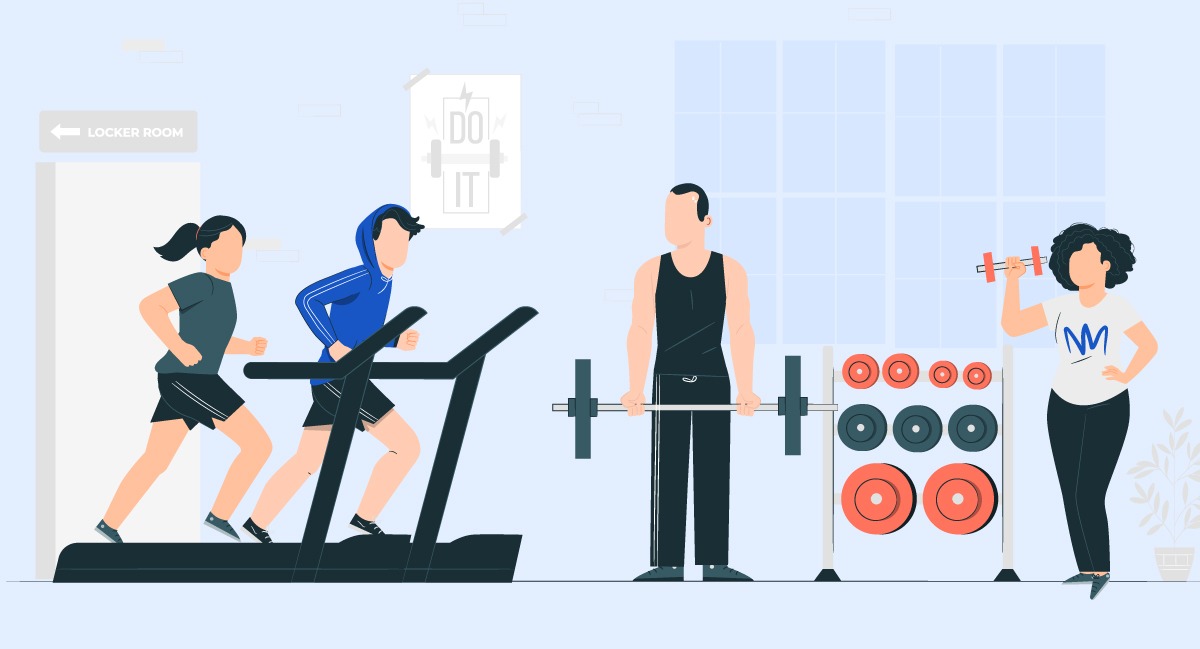In today’s fast-paced world, where many of us are glued to our desks or phones for hours, finding time for physical activity can feel like a challenge. However, prioritizing daily exercise is one of the most significant steps we can take to improve our health, boost energy levels, and enhance overall well-being. Whether you’re a fitness enthusiast or someone looking for ways to incorporate movement into your day, daily exercise offers numerous benefits for both the body and mind.
In this blog, we’ll explore the importance of daily exercise, why it should be a part of everyone’s lifestyle, and how it contributes to long-term physical and mental health. Additionally, we’ll provide practical tips on how to integrate exercise into your routine, regardless of your current fitness level.
1. **Physical Benefits of Daily Exercise**
Daily exercise is often promoted for its profound physical benefits. Regular physical activity keeps the body strong, improves endurance, and enhances flexibility. Let’s look at some of the key physical advantages:
a.Weight Management
Exercise plays a crucial role in maintaining a healthy weight. Whether your goal is weight loss or weight maintenance, incorporating both cardiovascular exercises (like walking, running, or cycling) and strength training (such as lifting weights or bodyweight exercises) helps burn calories, increase metabolism, and preserve lean muscle mass. Consistent physical activity also prevents excess weight gain by promoting a healthy energy balance.
b. **Cardiovascular Health**
Daily exercise is vital for heart health. It strengthens the heart muscles, improves circulation, and helps lower blood pressure. Activities such as walking, jogging, swimming, or cycling enhance cardiovascular endurance, which reduces the risk of heart diseases, including stroke, high blood pressure, and heart attacks. In fact, the American Heart Association recommends at least 150 minutes of moderate-intensity exercise per week to keep your heart in optimal condition.
c. **Stronger Muscles and Bones**
As we age, our muscles and bones naturally weaken, making us more prone to injury. Daily exercise helps to slow this process. Resistance exercises, like weight training and bodyweight exercises, increase muscle mass, improve bone density, and enhance overall strength. These activities are especially important for preventing osteoporosis and other bone-related issues as we get older.
d. **Improved Flexibility and Balance**
Incorporating activities such as yoga or Pilates into your daily exercise routine can improve flexibility and balance. These exercises enhance the body’s range of motion and help prevent injuries, especially in older adults. Better balance reduces the risk of falls, while improved flexibility allows for greater mobility and independence in daily life.
2. **Mental Health Benefits of Daily Exercise**
Daily exercise isn’t just about physical well-being—it also has tremendous positive effects on mental health. In an age where stress, anxiety, and depression are increasingly common, regular exercise offers a natural and effective solution for mental well-being.
a. **Stress Reduction**
Physical activity is a proven stress reliever. When you exercise, your body releases endorphins—commonly referred to as the “feel-good” hormones. These endorphins act as natural painkillers and mood boosters, helping to alleviate stress and create a sense of well-being. Additionally, engaging in regular physical activity can improve sleep, which is essential for reducing stress levels and improving mood.
b. **Enhanced Cognitive Function**
Daily exercise doesn’t just benefit your body; it’s also a workout for your brain. Physical activity improves blood flow to the brain, which promotes the growth of new brain cells and supports overall cognitive function. Studies have shown that people who exercise regularly have improved memory, concentration, and problem-solving abilities. This is particularly important as we age, as regular exercise can help reduce the risk of cognitive decline and neurodegenerative diseases like Alzheimer’s.
c. **Mood Enhancement and Combating Depression**
Exercise is a powerful tool for combating depression. Research shows that physical activity stimulates the production of neurotransmitters like serotonin and dopamine, which are essential for regulating mood and reducing feelings of sadness and anxiety. In some cases, exercise has been shown to be as effective as medication for treating mild to moderate depression, without the associated side effects.
d. **Boosted Self-Esteem**
Engaging in daily exercise can also lead to an increase in self-esteem and confidence. As you achieve your fitness goals—whether that’s running faster, lifting heavier weights, or simply feeling more energetic—you’ll develop a greater sense of self-worth. This boost in confidence often extends to other areas of life, improving relationships, career performance, and overall satisfaction.
3. **Long-Term Health Benefits of Daily Exercise**
The advantages of daily exercise go beyond the immediate physical and mental benefits. Regular activity can contribute to a longer, healthier life, reducing the risk of numerous chronic diseases.
a. **Reduced Risk of Chronic Diseases**
Regular exercise has been linked to a lower risk of developing chronic illnesses such as type 2 diabetes, certain cancers, and cardiovascular diseases. By improving insulin sensitivity and blood sugar levels, exercise helps prevent or manage diabetes. Furthermore, physical activity reduces inflammation and boosts immune function, which helps protect the body from various illnesses, including some forms of cancer.
b. **Increased Longevity**
Research consistently shows that individuals who exercise regularly tend to live longer, healthier lives. This is because exercise helps protect against many of the health issues that shorten lifespan, such as heart disease, obesity, and diabetes. Even moderate-intensity exercises, such as walking or gardening, can increase life expectancy by several years when done consistently over time.
c. **Improved Mobility in Aging**
Aging is a natural part of life, but daily exercise can help mitigate the effects of aging by maintaining muscle mass, bone density, and joint flexibility. Older adults who engage in regular exercise are more likely to retain their mobility and independence, which improves their quality of life in later years.
4. **How to Incorporate Daily Exercise into Your Routine**
For many, the biggest hurdle to daily exercise is finding the time. However, with a few simple strategies, you can make physical activity a regular and enjoyable part of your day:
a. **Start Small and Build Consistency**
If you’re new to exercise, start with small, manageable goals. Begin by incorporating 10-15 minutes of physical activity into your day and gradually increase the duration and intensity. Whether it’s a brisk walk around the block, a quick home workout, or a few yoga stretches, consistency is key. As you build the habit, you can expand your routine to include more challenging exercises.
b. **Choose Activities You Enjoy**
One of the best ways to ensure that you stick with daily exercise is to choose activities you genuinely enjoy. Whether it’s dancing, swimming, hiking, or cycling, engaging in activities that make you happy will make exercise feel less like a chore and more like a rewarding part of your day.
c. **Incorporate Movement Throughout the Day**
You don’t have to limit exercise to the gym. Simple changes, such as taking the stairs instead of the elevator, walking or biking to work, or even standing while working, can significantly increase your daily activity levels. Incorporating movement into your daily routine makes it easier to stay active without dedicating hours to formal workouts.
d. **Set Realistic Goals**
Setting achievable fitness goals helps you stay motivated. Whether your goal is to lose weight, improve strength, or reduce stress, having clear objectives will give you a sense of purpose and keep you on track. Be patient with yourself, and celebrate your progress along the way.
Conclusion
Daily exercise is essential for both physical and mental well-being. The benefits are vast, ranging from improved cardiovascular health and stronger muscles to reduced stress and better cognitive function. It’s never too late to start exercising, and incorporating even small amounts of activity into your day can have profound long-term effects. Whether you’re aiming to maintain a healthy weight, boost your mood, or simply improve your quality of life, making daily exercise a priority will lead to a healthier, happier, and more fulfilling life.
So, lace up your sneakers, get moving, and make daily exercise a part of your lifestyle!
Discover more from Beauty Cosmetics
Subscribe to get the latest posts sent to your email.

